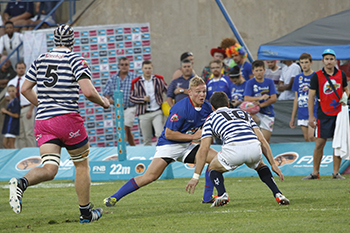 The lively Shimla flanker Daniel Maartens, who was the leading try scorer in the 2015 Varsity Cup, made a good impact as substitute against Ikeys in Cape Town.
Photo: Johan Roux |
His rugby team had the right attitude to win in difficult conditions in Cape Town.
This is what Hendro Scholtz, Head Coach of Shimlas, had to say after the University of the Free State (UFS) started its Varsity Cup campaign on 8 February 2016 with a victory of 23-17 over Ikeys.
According to him, the UFS had to sweat hard until the end on a windy Green Mile, which has been the downfall of many opponents before. His substitutes also had a great impact.
Troublesome Cape wind
Shimlas have a tough draw this year, and to start in the Mother City was a huge task. Scholtz and his men have only three home matches and will play against most of the major teams in away matches.
“We knew it would be difficult in Cape Town. With the wind blowing as it does, one can't play as you would like to during the rest of the season,” the coach said.
“The guys had a will to win.”
The former Springbok believes that too much cannot be read from the first round results. The Shimlas will play their second match on 15 February 2016 against Tuks in Pretoria.
Replacements with good impact
Only the prop Rudolph Botha, flanker Fiffy Rampeta, and prop Teunis Nieuwoudt, who started against Ikeys, were involved in the 2015 final against Pukke.
Other big Shimla names, such as the prop Ox Nche, hooker Elandré Huggett, prop Conraad van Vuuren, and flanker Daniel Maartens, were sent onto the field in Cape Town after half-time.
“We had a plan with the replacements for the second half. They made a huge difference,” Scholtz said.
Rampeta was named Man of the Match, but it was Maartens and Co who turned the game in their team's favour in the second half.
Matsoele could be out of action for long
The Shimla fullback, Sechaba Matsoele, had to leave the game against Ikeys early because of a knee injury, and could be out of action for some time.
His scrumhalf, Zee Mkhabela, was also injured (by a blow to the head), so Shimlas will have to keep their fingers crossed for his quick recovery.
Scorers:
Shimlas 23 (7): Tries: Arthur Williams, Nardus Erasmus, Mosolwa Mafuma. Conversions: Stephan Janse van Rensburg (2).
Ikeys 17 (0): Tries: Khanyo Ngcukana, Nathan Nel. Conversion: Hilio de Abreu. Penalty: De Abreu.
Other results (home team first): Tuks 15, Pukke 38; UJ 19, Madibaz 12; Maties 40, CUT 0.